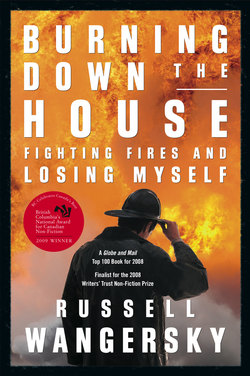Читать книгу Burning Down the House - Russell Wangersky - Страница 7
На сайте Литреса книга снята с продажи.
ОглавлениеPreface
I have seen people in their most unguarded moments—where their family members have died, at accident scenes where the breadth of the destruction has already started to sink in but no one has any idea how long that destruction will last, and at fires where families have seen their homes and memories destroyed. I don’t mean to trade on that, at least not by describing private individuals in anything close to identifiable detail. In fact, in some cases I have intentionally made it difficult to identify people, although I have stayed away from establishing composite or fictionalized characters: what happened is true, you just may not be able to find out who it actually happened to. And that’s probably for the best.
A second thing: this book is based on the most malleable of things—memory. My own memory, in fact. I didn’t take notes during my years of firefighting because, first of all, I had not planned to write this and, secondly, there wouldn’t have been time. Any mistakes or mistaken impressions are my own and should be seen in that light. There are hundreds of other versions of these same events, and they are equally true. By the time I was finished fighting fires, I had suffered a tremendous amount of psychological stress; it’s quite possible that my memories are very different from the memories of other firefighters at the same scenes.
These are, warts and all, my experiences.
One small warning: firefighting is a graphic business, so some of the writing you will encounter in this book is explicit. It has not been written merely to shock; I could have written about much more shocking things. I have simply tried to describe events in the way they happened.
It may well be disturbing, and to a degree offensive. People who regularly face disturbing images have a blunt way of dealing with them, and often an offhand sense of humour that may seem unfeeling or hard-hearted. It is neither. More than anything else, it is a kind of coping mechanism.
I served in two very different volunteer fire departments: one in the Annapolis Valley town of Wolfville, Nova Scotia; and one in Portugal Cove–St. Philip’s, on Newfoundland’s Avalon Peninsula. The first was a long-established fire department with an enviable and remarkable history; the other was brand new, started from the ground up. Both were departments that fought fires as well as responding to highway accidents and medical emergencies. One was a department where I dealt solely with strangers; in the second, the victims were occasionally acquaintances or friends. Both departments presented situations that were disturbing, albeit in different ways. Both were also extremely skilled, trained and professional, and if my house were burning or I were in a car accident, I would put my family and myself in their capable hands without a moment’s hesitation.
There were many differences between the two departments, but at least two crucial things were the same: the incredible willingness of individuals to donate both their time and their hard physical work to help others, and the way that people who called either department had no choice but to allow us into the most frightening, embarrassing and emotional times of their lives.
If you recognize yourself in here, please trust that the recognition will only be clear to yourself and to others on the scene who already know about it anyway. Nothing in this book will let a neighbour or a stranger into your living room. I know what your hands look like in front of your face: I’m the only one who knows it was actually you. To those involved, I offer my apologies from the start for this intrusion.
No one asked me into their home or their personal disaster to do research for a book. I didn’t ask for what I’ve gotten either, and that’s more of what this book is meant to be about.
I would especially like to apologize to my ex-wife, Barbara Pratt. She, more than anyone, did not ask for this, or anything like this. Please keep in mind that this is just one side of a story. I have done what I can to preserve her privacy, but anyone who reads this should understand that her impression of the same events is likely much different—and may well, in many ways, be more accurate.
I hope, in the end, that no one will feel I have taken advantage.
